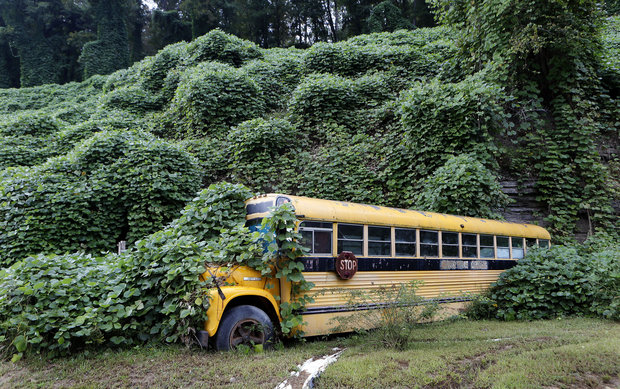When we moved into our Ginter Park home fourteen years ago, I had grand plans. The back yard was huge by city standards, perfect for our young son and this aspiring gardener. I had a vision of all the children in the neighborhood flocking to our yard, playing barefoot in the thick grass while butterflies and honey bees flitted from flower to flower in our ever-blooming perennial bed. I would come out of the house in my A-line dress and pearls to serve fresh-squeezed lemonade and cookies in the gazebo. As supper neared, parents would stop by to collect their children, and I’d offer them cocktails in the shade of our fruit trees, handing them baskets of surplus tomatoes, peppers, squash, and cucumbers just picked that day from our vegetable garden. Then, after everyone had gone home and the sun had begun to set, solar lights of every color would twinkle from the bushes and trees, while we dined on homegrown food, seated next to our crystal koi pond.
It was a good plan. And it remains, still, a plan, yet to be realized.
Unlike most city kids from the 1970’s, I grew up with a garden. My father watched Euell Gibbons one winter and that spring we were clearing the brambles and briars from a vacant lot next to our house in preparation for our first garden. Dad purchased an enormous tiller, and began turning the earth. We planted seeds, indoors and out, each year for our garden. My sister and I tended our own plot: I took the tomatoes and she took the peppers. We watched “Happy Days” and “Laverne & Shirley” while shelling butterbeans. We ate weird new vegetables like kohlrabi and Russian kale that my father discovered in his seed catalogues. And when we moved to a new home, my dad, once again, carved out of a wooded lot, a beautiful azalea garden with over two hundred azaleas, rhododendrons, and camellias. Every Easter, his yard is a riot of color and life.
So when I made these grand plans for my back yard, I believed they were well within my grasp. In fact, my experience helping my parents create their own Garden of Eden convinced me that I had all I needed to create my own. After all, I believed them when they told me that I could do anything if I put my mind to it.
What I didn’t count on was how hard it would be. Previous owners installed an abundance of quince apple bushes, that look beautiful for about two days in the spring, and then look stringy and bare the rest of the year. I figured perhaps this was a lemonade-out-of-lemons kind of problem, so in the fall, I picked the quince apples to make jam, as they do in England. But if you’ve never held a quince apple, they about the size of your palm and hard as rocks. By the time I finished peeling and coring them – which took the better part of an hour – I had exactly one cup of minced quince apple from nearly five bushes. I might have included them in a salad, had they not caused my mouth to pucker from the inside out when I tasted them. Needless to say, the quince apple bushes are gone.
Then there are the vines. Sometime in the mid-to-late nineteenth century, homeowners from all over the country introduced exotic new plants from Asia to their humdrum gardens. Thanks to their ingenuity, cinnamon vines and Chinese wisteria grow all over my yard – especially in my small and struggling perennial bed. You can’t kill the vines. They’re stealthy. They send infinite, underground shoots, overrunning every corner of yard. Pulling them up or digging them out doesn’t work. Poisons require repeated application, which is terrible for the butterflies and honeybees I want flitting on my flowers. Thankfully, knock wood, bamboo has not found it’s way to my yard. Golden bamboo is a relentlessly invasive weed, defying most poisons, surviving all weather, resisting all blight. Our neighbors on the next block, have not been so lucky as I.
My vegetable garden hasn’t fared much better. I cleared and boxed in two raised beds, filled them with garden soil, and just as I did as a child, I planted my seeds. Dusty mildew kills every squash and cucumber I plant. Birds eat my beet and sunflower seeds. My carrots and parsnips didn’t even come up this year. So, when my heirloom tomatoes actually grew and bore fruit, I was nearly giddy. That was until the squirrels nabbed each and every almost-ripe tomato, took bite, and left the rest in my driveway as a parting gift. I’ve tried everything to stop the squirrels – from cayenne to garlic spray to a solar-powered plastic owl whose heads spin every fifteen minutes. Nothing has worked so far in my war against the squirrels. So this year, I built a cage for my tomatoes. So far, I’ve trapped one bird with it.
My experience as a frustrated gardener is why today’s lectionary text is so very annoying. I plant the seed and very little comes up. What does sprout has to fight for survival against disease, invasive vines, birds, and squirrels. Seedlings are entirely dependent on me to water them, to protect them with an anti-fungal spray, to pull up every cinnamon vine that threatens to choke them. And sometimes, I forget.
But the real kicker of this passage is that unwieldy mustard tree.
Mustard trees were considered weeds, highly invasive and very hard to kill. No gardener in her right mind would intentionally plant a mustard seed in her garden. They grew everywhere – like bamboo – great, big, sprawling, uncontrollable plants, that sheltered all types of birds and small animals. It would take over any garden, and invite the sort of wildlife you least wanted around your freshly sown seeds and Brandywines.
And this is what the Kingdom of God is supposed to be like?
You see, the trouble with many Christians – me included – is that we aren’t trying to build the Kingdom of God, so much as we are trying to rebuild the Garden of Eden. The archetype of the Garden Eden is as persistent as a dandelion. It keeps popping up, even after we’ve pulled it out. We keep aiming for something long ago, something we’ve lost, hoping we can recapture what we once had. Instead, we need to be looking forward, sowing the seeds of the Gospel even in the dark places, aiming for something much larger and much more inclusive than Eden ever was.
The Kingdom of God isn’t the Garden of Eden reborn. It’s an unruly, uncontrollable, invasive weed that sends shoots throughout the world, inviting anyone and everyone to come along, without checking with us first. We’re asked to conspire in this invasion by sowing the seeds. These are the seeds of acceptance, kindness, justice, peace, and love. There’s no telling who will show up when we throw that kind of goodness into the world – which is why it’s so unwieldy, so scary and so dangerous. That kind of radical inclusion generally leads to a cross.
The Jewish people also had an idea of what the Kingdom of God would look like. It would be the Kingdom of Israel, conquering their enemies, enlarging their borders. Their great wealth would draw all the nations to them. They would be respected in the land. They wanted a king to make them into the Kingdom of Israel, against the wishes of their God. So they chose Saul – a man tall and strong, ready to fight and bring back the spoils of victory. It was a choice everyone, including God, regretted.
The insignificance of a teenage boy, tending sheep, forgotten by his father; the worthlessness of a tiny seed sown in someone’s garden becomes transformed into unimaginable greatness – not because of anything humans did, but because we have a God who takes the inconsequential and turns it into glory. This is grace: we offer what we can, we show up with what we have, and God makes it into more than anything we could dream of. We show a bit of kindness, we offer a plate of food, we lend a hand or a shoulder or a smile; and suddenly a seed is planted, growing, invading, sending shoots throughout a world that is desperate for a shaded place to rest.
The Kingdom of God is at hand – at our hand. When we open up our hands to spread the Gospel everywhere, it becomes the most relentless, invasive force in our world. We just have to be prepared because it isn’t the garden we planned. It isn’t even the garden God planned. But it is a Kingdom of life – brimming with all the colors of the universe, noisy and boisterous, messy and beautiful. It’s a Kingdom where all are invited, even us, and yes, even squirrels.
Amen.
Preached on I Samuel 15:34-16:13 and Mark 4:26-34 at The Hermitage on June 14, 2015.



Beautiful. Came across this as my devotional is on the mustard seed. Where I come from, there are only mustard greens. So I browsed again for pictures of mustard trees. I have seen some before in pictures but yours is really huge! Very insightful piece on the mustard tree being invasive, etc. God bless you.
So glad you enjoyed it!
Found your picture and article when looking up invasive mustard plants for my sermon tomorrow. Lovely and inspiring words. They have certainly fed into what I will share in my service.
Thank you, Michael – so glad it helped!